Some people have asked me about that book I was reading at the Saint Vincent de Paul’s Walk/Run for the Poor event, which I mentioned in my prior blog post from just over a week ago. Well, it was Hillbilly Elegy: A Memoir of a Family and Culture in Crisis (July 2016) by J.D. Vance.
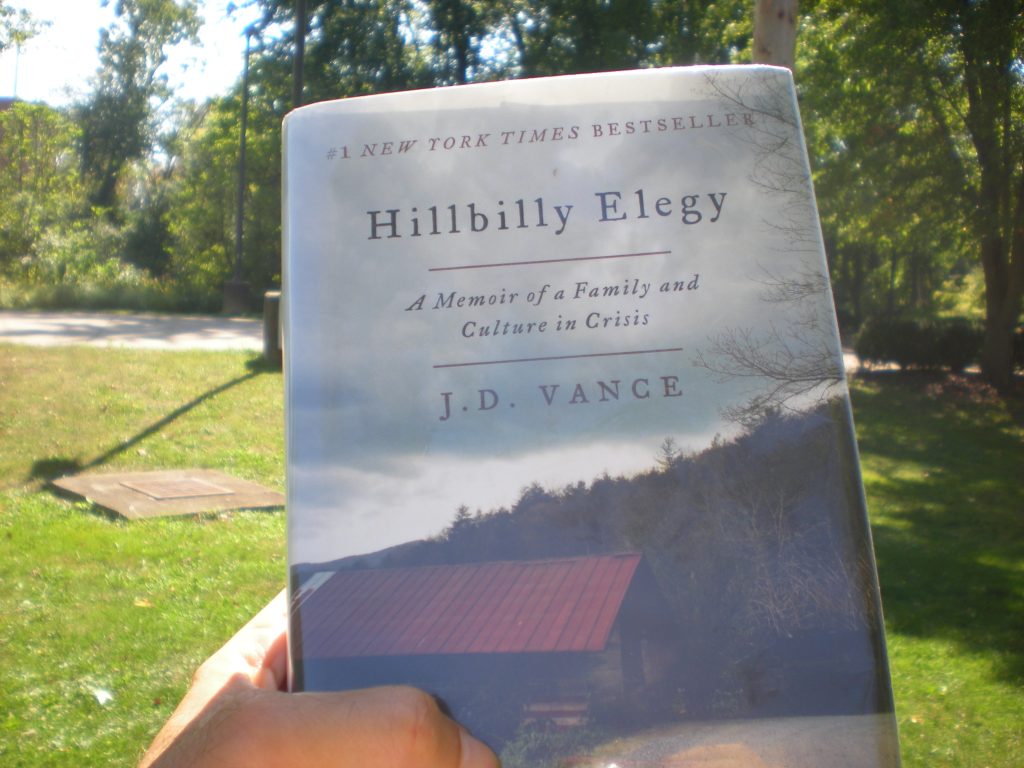
Backstory
I decided to read the book when there was a lot of speculation about President Donald Trump’s possibly choosing J.D. as his running mate. This was early July. The weekend before Trump made the announcement on about 15 July that he, indeed, chose J.D. as his running mate, I performed an online search to view whether my local library had any copies of the book. It did. It had one on the shelf at the Warren main branch.
I thought about putting a hold on it but then realized I needed to go to the library for something anyway, so I just waited and went to the library the following evening. Sure enough, somebody had already checked-out the book. After I went home, I logged onto the library’s system and requested to be put on the wait list. At the time, I believe I was the 28th person on the wait list! Demand for that book surged in just one day.
Anyway, nearly eight weeks later, on the 5th of September, I got a notice from the library that the book was ready for pick-up at the self-service outdoor locker at the Cortland branch. I picked it up a day or so later.
Nevertheless, I didn’t really start reading it until a few days before that SVdP event. And, given I’m a frustratingly slow reader, I only finished half of it before it was due on the 26th of September, because of the long wait list. So, I’ll just share some aspects of the book from the first half, through chapter 8 (page 128 of 261 pages)
Book Preview – First Half
As a memoir, J.D. writes about his challenging upbringing in Middletown in southwestern Ohio and Jackson, Kentucky. He also provides some history of his relatives, especially on his mom’s side of the family.
He describes how so many people, particularly white working class of Scots-Irish heritage, living in the hills of eastern Appalachia Kentucky, who often lack upward mobility and job opportunities, leave the area in hopes of better opportunities. His maternal grandparents did just that; they packed up at the ages of 13 and 17, recently married (I believe) with a baby on the way, and drove on U.S. Route 23 to settle in Middletown, Ohio to start their young family.
U.S. Route 23
U.S. Route 23 is also dubbed the “country music highway.”
Before Lyndon Johnson and the Appalachian Regional Commission brought new roads to southeastern Kentucky, the primary road from Jackson to Ohio was U.S. Route 23. So important was this road in the massive hillbilly migration that Dwight Yoakam penned a song about northerners who castigated Appalachian children for learning the wrong three R’s: “Readin’, Rightin’, Rt. 23.” Yoakam’s song about his own move from southeastern Kentucky could have come from Mamaw’s diary:
They thought readin’ writin’, Route 23 would take them to the
good life that they had never seen;
They didn’t know that old highway would lead them to a world
of misery.
Mama and Papaw may have made it out of Kentucky, but they and their children learned the hard way that Route 23 didn’t lead where they hoped. [Pages 36-37]
Once Ideal Towns
He referenced how Middletown was once considered an ideal town similar to ones near Cleveland and Columbus, respectively [Page 48]:
“We saw ourselves as a really fine community, on par with Shaker Heights or Upper Arlington,” explained a decades-long veteran of the public schools, comparing the Middletown of yore to some of the most successful of Ohio’s suburbs. “Of course, none of us knew what would happen.”
Erosion Rather Than Mudslide
In my hometown in Northeast Ohio, I’ve witnessed both aspects: the seemingly slow erosion while living in the area; the mudslide while living in more vibrant areas of the USA and then returning to areas I hadn’t seen in several years. [Page 50]
If Middletown had changed little by the time I was born [ca. August 1984], the writing was on the wall almost immediately thereafter. It’s easy even for residents to miss it because the change has been gradual—more erosion than mudslide. But it’s obvious if you know where to look, and a common refrain for those of us who return intermittently is “Geez, Middletown is not looking good.”
Family Income
In Appalachia eastern Kentucky, many people call their grandmothers and grandfathers Mamaw and Papaw, respectively.
In this snippet, he references that his family earned a good income, briefly, of more than $100,000 annually. His mom was a nurse at a hospital and his step-dad at the time was a truck driver. This was 1993 when J.D. was nine years old. If we were to adjust the household income for CPI (est. 3.5% inflation per year), then the income would be equivalent to about $200,000-$225,000 annually in 2024. [Pages 70-71]
In Preble County, [Ohio] with Mamaw and Papaw over forty-five minutes away, the fights turned into screaming matches. Often the subject was money, though it made little sense for a rural Ohio family with a combined income of over a hundred thousand dollars to struggle with money. But fight they did, because they bought things they didn’t need—new cars, new trucks, a swimming pool. By the time their short marriage fell apart, they were tens of thousands of dollars in debt, with nothing to show for it.
Book of Mamaw: A Parable
Mamaw often told a parable: A young man was sitting at home when a terrible rainstorm began. Within hours, the man’s house began to flood, and someone came to his door offering a ride to higher ground. The man declined, saying, “God will take care of me.” A few hours later, as the waters engulfed the first floor of the man’s home, a boat passed by, and the captain offered to take the man to safety. The man declined, saying, “God will take care of me.” A few hours after that, as the man waited on his roof—his entire home flooded—a helicopter flew by, and the pilot offered transportation to dry land. Again the man declined, telling the pilot that God would care for him. Soon thereafter, the waters overcame the man, and as he stood before God in heaven, he protested his fate: “You promised that you’d help me so long as I was faithful.” God replied, “I sent you a car, a boat, and a helicopter. Your death is your own fault.” God helps those who help themselves. This was the wisdom of the Book of Mamaw. [Pages 86-87]
Papaw’s Death
J.D.’s Papaw died just after he turned 13 in 1997 [Pages 104-107]
Papaw died on a Tuesday, and I know this because when Mom’s boyfriend, Matt, drove me to a local diner the next morning to pick up food for the whole family, the Lynyrd Skynyrd song, “Tuesday’s Gone” was playing on the radio. “But somehow I’ve got to carry on / Tuesday’s gone with the wind.” That was the moment it really hit me that Papaw was never coming back.
Knowledge vs. Intelligence
Most of all I thought about Papaw and me. I thought about the hours we spent practicing increasingly complex math problems. He taught me that lack of knowledge and lack of intelligence were not the same. The former could be remedied with a little patience and a lot of hard work. And the latter? “Well, I guess you’re up shit creek without a paddle.” [Page 108]
The Measure of a Man
I thought about how Papaw would get on the ground with me and Aunt Wee’s baby girls and play with us like a child. Despite his “bullshits” and his grouchiness, he never met a hug or a kiss that he didn’t welcome. He bought Lindsay [J.D.’s older sister by five years.] a crappy car and fixed it up, and after she wrecked it, he bought her another one and fixed that one up, too, just so she didn’t feel like she “came from nothing.” I thought about losing my temper with Mom or Lindsay or Mamaw, and how those were among the few times Papaw ever showed a mean streak, because, as he once told me, “the measure of a man is how he treats the women in his family.” His wisdom came from experience, from his own earlier failures with treating the women in his family well. [Page 108]
Historical Population | Three Cities
J.D. mentioned the poverty in small-town Jackson, Kentucky and the slow errosion of the quality of living in Middletown, Ohio.
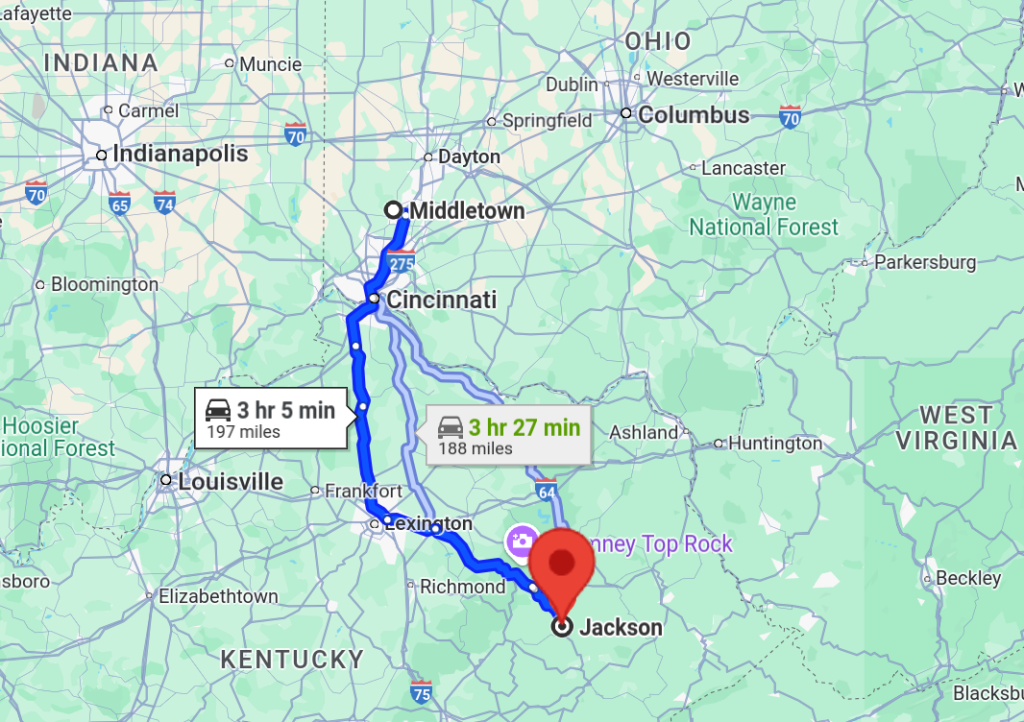
So, I wanted to understand it, to an extent, relative to my own hometown of Warren in Northeast Ohio, which is 265 miles northeast of Middletown and near the Pennsylvania border.
My area is a shadow of itself from its heydey prior to 1970. We lost probably over half to three-quarters of the well paying jobs that also included pensions from the steel mills, auto manufacturing companies, and all the related fabrication, tool & die, and engineering firms that serviced those companies.
Interestingly, a contact had just posted pictures of Appalachia (West Virginia bordering eastern Kentucky) and wrote that it is both beautiful (the hills, bridges, and landscape) and sad (the economic decline and shuttered stores and buildings). I agree, and it reminds me of my own hometown and surrounding areas in the Rust Belt. I wrote this as a comment to her post:
I hope this is the low point for my area (I live in the Rust Belt on the formal edge of Appalachia). I believe it is. Here’s why:
My comment on social media (2024-09-29)
Few people, including many people in finance/economics, understand that we need to Repeal 1913 (End the FED and the IRS), STAT. Ever since we went entirely off of the gold standard in 1971, the USA has been pillaged and plundered by our uni-party corrupt representatives – sending hundreds of billions of dollars per year to other nations, along with massive numbers of jobs (practically entire industries): steel mills, coal mining, oil drilling, car manufacturing, tech and customer support services, and the list goes on.
I sense we are in the process of doing the right thing, though (Repealing 1913).
Let’s see what happens.
I went on to state that I’ve written about this topic a lot in the past.
So, if you decide to read Hillbilly Elegy and are also familiar with the Rust Belt or my area in Northeast Ohio, then understand that Warren is evidently worse off than that of Middletown and Jackson, KY. For instance, Warren has more than 35% of its population living in poverty, whereas Jackson has about 20% of the population living in poverty. Middletown has about 23% living in poverty (reference the Wikipedia link shared earlier). Compare that to the overall USA, which is estimated to have just under 10% of the population living in poverty.
So, J.D. is probably right about Middletown; poverty has increased. However, the city hasn’t experienced the massive loss of population that can cripple a town or city like many of the Rust Belt cities have experienced, and to an extent, Jackson, KY (although it’s a really small town, a holler as they say in Appalachia).
Population Change | Table
Take a look at these figures from the three charts that are shared afterward.1I made the charts using LibreOffice Calc, an opensource spreadsheet application comparable to Microsoft Excel.
| City | Peak Year | Peak Population | Recent Population (2024) | % change |
|---|---|---|---|---|
| Middletown, OH | 2024 | 51,629 | 51,629 | 0% |
| Warren, Oh | 1970 | 63,494 | 38,614 | -39% |
| Jackson, KY | 1980 | 2,651 | 2,092 | -21% |
Population Trends | Charts
Jackson, KY
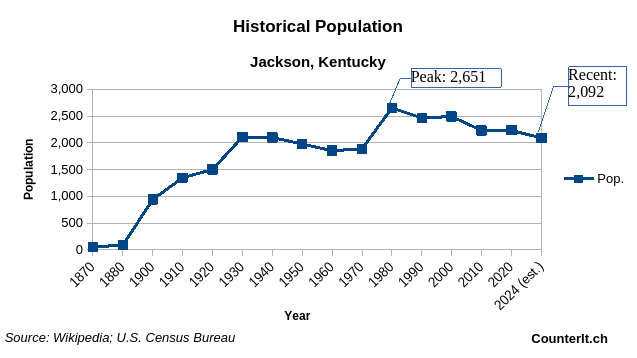
Middletown, OH
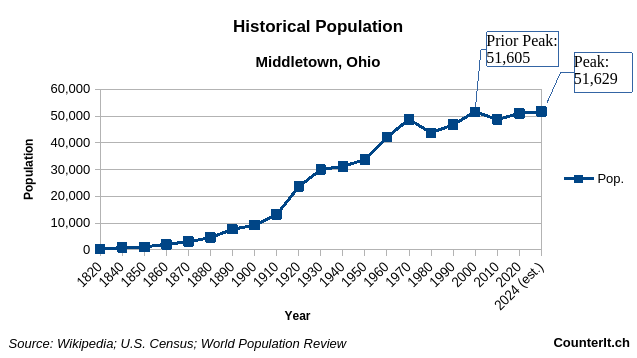
Warren, OH
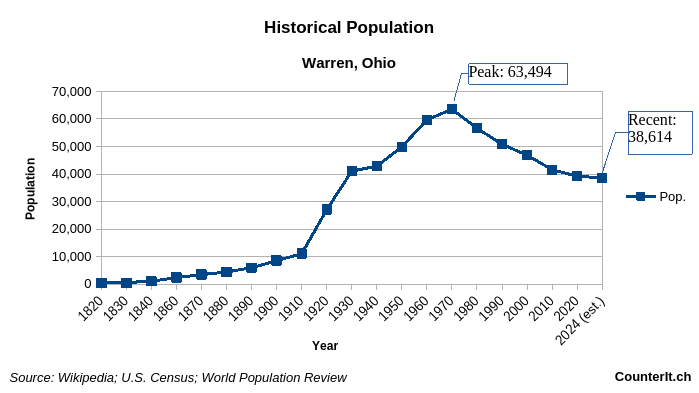
Closing Words
After returning Hillbilly Elegy to the library by the due date, I promptly put my name on the wait list again, since I want to read the second half of the book, ideally before I vote by the deadline of Tuesday, 05 November, given I want to be well informed.
Moreover, I still want to assess other options for the presidential candidate, including just writing in one of my favorites: the brilliant man of integrity, congressman Thomas Massie.2Interestingly, he lives in northeastern Kentucky in the town (or holler) of Vanceburg, population 1,400 (38% poverty).
There are a lot of labels floating out there, you know. Libertarian-leaning Republican, Constitutional Conservative, Tea Party, Deplorable.3This is twice-failed presidential candidate Hillary Clinton’s favorite divisive insult to a nontrivial group of citizens. I’ve been called a redneck and a hillbilly and a nerd and a geek. I’ll go with any of those labels.
~Thomas Massie, US Congressman, Kentucky
Nevertheless, let me know whether you decide to read the book, and feel free to share your opinions in the comments.
Footnotes
- 1I made the charts using LibreOffice Calc, an opensource spreadsheet application comparable to Microsoft Excel.
- 2
- 3This is twice-failed presidential candidate Hillary Clinton’s favorite divisive insult to a nontrivial group of citizens.
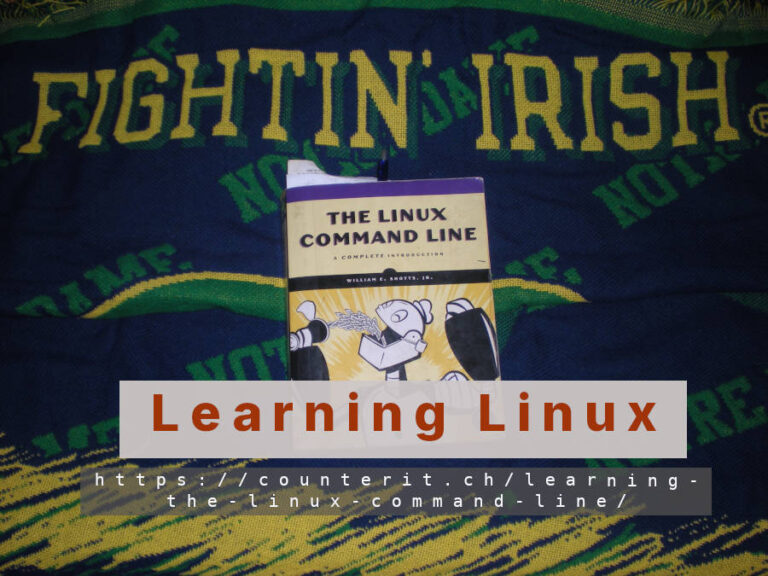
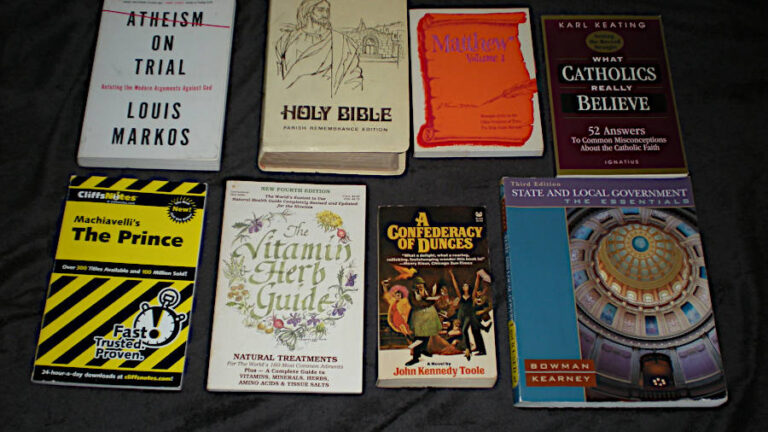
How do JD Vance’s personal experiences influence his views on social and economic issues in his community?
Regard IT Telkom